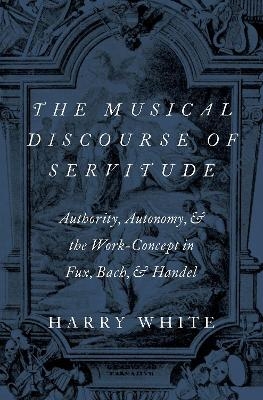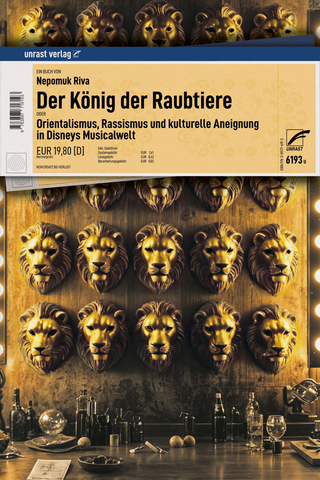
The Musical Discourse of Servitude
Authority, Autonomy, and the Work-Concept in Fux, Bach and Handel
Seiten
2020
Oxford University Press Inc (Verlag)
978-0-19-090387-9 (ISBN)
Oxford University Press Inc (Verlag)
978-0-19-090387-9 (ISBN)
The Musical Discourse of Servitude presents a new theory of how the late baroque musical imagination developed by comparing the compositions of Johann Joseph Fux, J. S. Bach, and G. F. Handel.
Examining, for the first time, the compositions of Johann Joseph Fux in relation to his contemporaries Bach and Handel, The Musical Discourse of Servitude presents a new theory of the late baroque musical imagination. Author Harry White contrasts musical "servility" and "freedom" in his analysis, with Fux tied to the prevailing servitude of the day's musical imagination, particularly the hegemonic flowering of North Italian partimento method across Europe. In contrast, both Bach and Handel represented an autonomy of musical discourse, with Bach exhausting generic models in the mass and Handel inventing a new genre in the oratorio. A potent critique of Lydia Goehr's seminal The Imaginary Museum of Musical Works, The Musical Discourse of Servitude draws on Goehr's formulation of the "work-concept" as an imaginary construct which, according to Goehr, is an invention of nineteenth-century reception history. White locates this concept as a defining agent of automony in Bach's late works, and contextualized the "work-concept" itself by exploring rival concepts of political, religious, and musical authority which define the European musical imagination in the first half of the eighteenth century. A major revisionist statement about the musical imagination in Western art music, The Musical Discourse of Servitude will be of interest to scholars of the Baroque, particularly of Bach and Handel.
Examining, for the first time, the compositions of Johann Joseph Fux in relation to his contemporaries Bach and Handel, The Musical Discourse of Servitude presents a new theory of the late baroque musical imagination. Author Harry White contrasts musical "servility" and "freedom" in his analysis, with Fux tied to the prevailing servitude of the day's musical imagination, particularly the hegemonic flowering of North Italian partimento method across Europe. In contrast, both Bach and Handel represented an autonomy of musical discourse, with Bach exhausting generic models in the mass and Handel inventing a new genre in the oratorio. A potent critique of Lydia Goehr's seminal The Imaginary Museum of Musical Works, The Musical Discourse of Servitude draws on Goehr's formulation of the "work-concept" as an imaginary construct which, according to Goehr, is an invention of nineteenth-century reception history. White locates this concept as a defining agent of automony in Bach's late works, and contextualized the "work-concept" itself by exploring rival concepts of political, religious, and musical authority which define the European musical imagination in the first half of the eighteenth century. A major revisionist statement about the musical imagination in Western art music, The Musical Discourse of Servitude will be of interest to scholars of the Baroque, particularly of Bach and Handel.
Harry White is Professor of Music at University College Dublin and a Fellow of the Royal Irish Academy of Music. He is widely acclaimed as the foremost cultural historian of music in Ireland.
Preface & Acknowledgements
Introduction: Servitude, Autonomy and the European Musical Imagination
Chapter 1: The Minstrelsy of Heaven: Servility, Freedom and the Dynastic Style
Chapter 2: The Virtuoso of Submissiveness: Fux and the Concept of Authority
Chapter 3: The Steward of Unmeaning Art: Bach and the Musical Subject
Chapter 4: 'A Darkness Which Might be Felt': Handel, Fux and the Oratorio
Chapter 5: Steps to Parnassus: Fux, Caldara and Bach
Conclusion: Well, well, well: Fux, Bach and Handel
Select Bibliography
Select Index
| Erscheinungsdatum | 01.10.2020 |
|---|---|
| Zusatzinfo | 56 music examples |
| Verlagsort | New York |
| Sprache | englisch |
| Maße | 241 x 160 mm |
| Gewicht | 454 g |
| Themenwelt | Kunst / Musik / Theater ► Musik ► Allgemeines / Lexika |
| Kunst / Musik / Theater ► Musik ► Klassik / Oper / Musical | |
| Kunst / Musik / Theater ► Musik ► Musiktheorie / Musiklehre | |
| ISBN-10 | 0-19-090387-2 / 0190903872 |
| ISBN-13 | 978-0-19-090387-9 / 9780190903879 |
| Zustand | Neuware |
| Informationen gemäß Produktsicherheitsverordnung (GPSR) | |
| Haben Sie eine Frage zum Produkt? |
Mehr entdecken
aus dem Bereich
aus dem Bereich
die Geschichte der Schallplatte
Buch | Hardcover (2024)
Prestel (Verlag)
CHF 51,90
Orientalismus, Rassismus und kulturelle Aneignung in Disneys …
Buch | Softcover (2024)
Unrast Verlag
CHF 27,70


